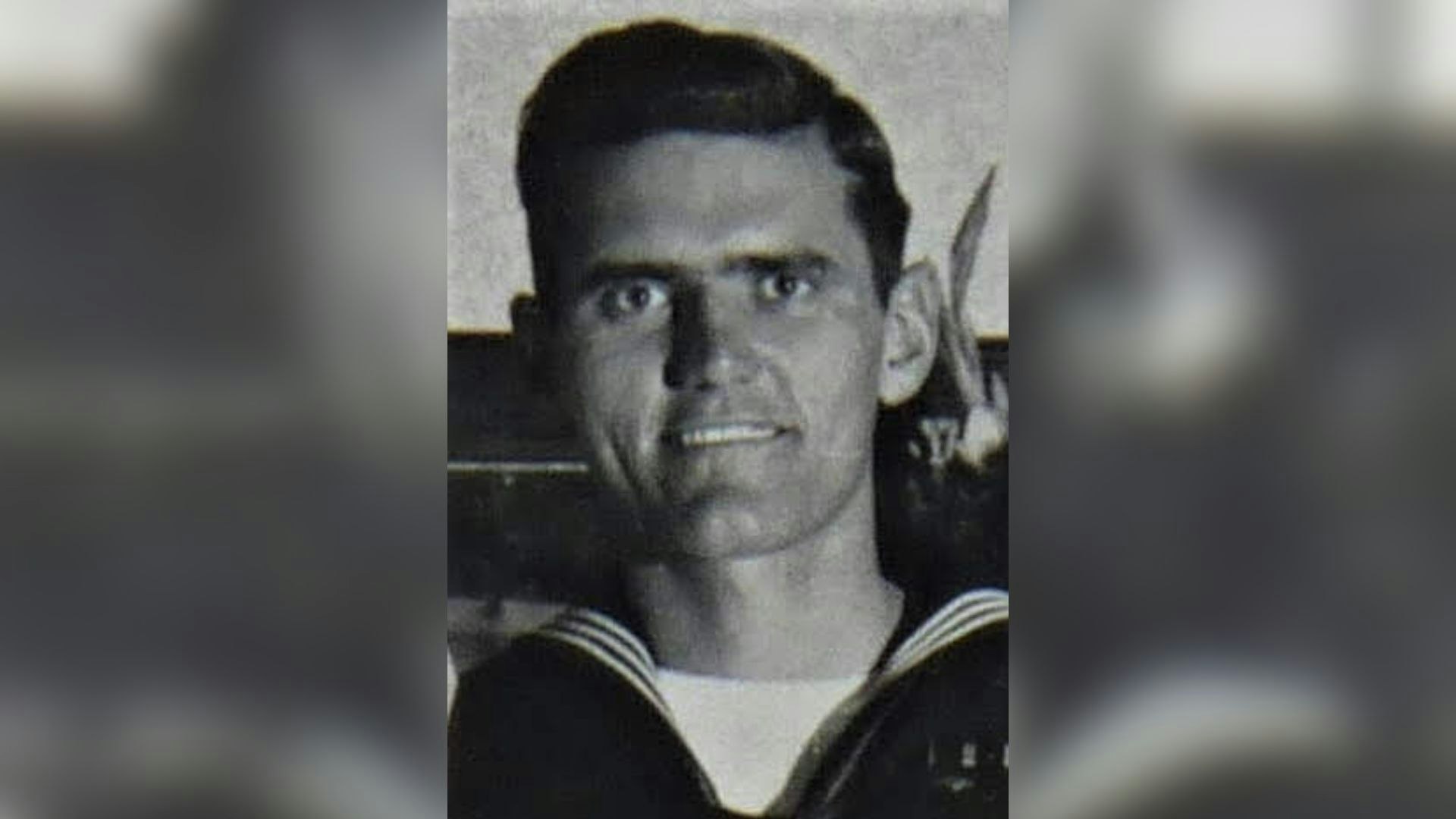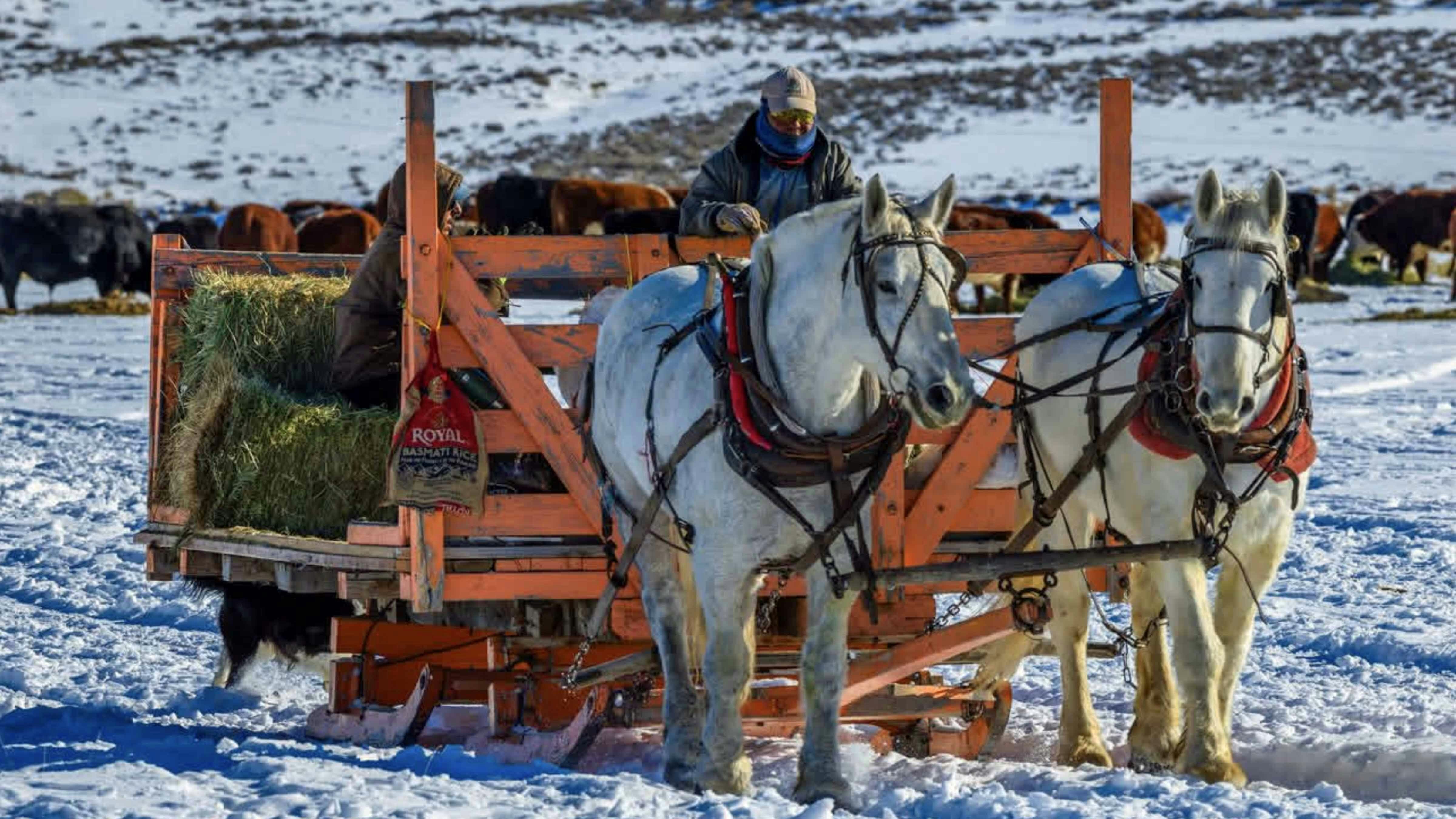By Wendy Corr, Cowboy State Daily
While most of Wyoming is crawling out of the deep freeze, there are some who remember when the weather was just as brutal – without the amenities we have now to help deal with it.
Folks like 97-year-old Marv Nottingham, who recalls working as a young man on the Garber Ranch near Big Horn, feeding cattle when it was minus 40 degrees.
“I was working for the Garber brothers, and they ran pigs, and they also ran cattle,” Nottingham told Cowboy State Daily. “We had to feed the cattle, so we loaded hay from the barn into a wagon and hooked on a team of horses and drove out to the field and pitched the hay off the wagon to the livestock at 40 below.”
The chore also was a race against the clock.
“I remember looking down the tip of my nose and knowing I better get to the barn because I was freezing,” he added.
Nottingham has lived a long and interesting life, from his childhood in the mountains of Wyoming to the perils of Iwo Jima during World War II, then later as a school administrator in California.
Many of those experiences he’s recorded in books that detail his experiences during the war, like “Once A Cowboy,” as well as wisdom passed on from his years as a school administrator in “Principles for Principals” and “Victor and Connections to Pacific Spiny Lobster: Tales of Land and Sea.”
In “Once A Cowboy,” Nottingham poses the question: “Do people create their destinies? Or are destinies created by influential persons among the many encounters with others that life entails?”
Nottingham’s life, influenced by tragic events and joyous adventures, is one that he looks back on with fondness.
Early Tragedy
Born in Sheridan on July 31, 1925, Nottingham had barely entered the world when hardship came calling.
When he was just 9 days old, his mother killed herself. He was fortunate, he said, that he was adopted almost immediately by the Nottingham family in Big Horn.
But tragedy scarred his family life again when Nottingham was a young boy.
“My adopted father died when I was 7 years old,” said Nottingham, “and my adopted mother, Anna, pretty much raised me.”

Growing Up In Rural Wyoming
Growing up in rural Big Horn, Nottingham learned early the value of hard work, even in the toughest of conditions.
“I was trying to help my mother make a living and so I did a lot of selling things – like I was a salesman at the Brinton Ranch and for other wealthy ranchers,” he said. “I spent a lot of times in the mountains of Big Horn hunting for deer, and also taking care of sheep for other people.”
He recalled helping to dig a well in Montana when he was 15, and at 16 took a job as a full-time worker at a bird farm making $100 a month. He also recalled cutting ice off the surface of nearby Lake DeSmet and hauling it back to Big Horn to use for refrigeration.
“We’d take it back home and put it in the cellar,” he recalled. “We had a basement cellar, dug in the ground in Big Horn, and we had chunks of ice in there that kept the food cold.”
Nottingham said the Garber family was a major influence in his life, particularly his friendship with Victor Garber, the family’s eldest son.
“Victor rode his horse into the school building one day,” Nottingham recalled with a laugh.
When he graduated high school, Nottingham was the valedictorian of his class of seven students. He chose to attend the University of Wyoming and took a job as a chemist.
But World War II was in full swing, and his life would soon drastically change.
Entering the War
Nottingham said he was actually shamed into enlisting just before his 20th birthday.
“One day a friend of mine and I were down in Denver walking the streets, and a soldier went by and said under his breath, ‘4F,’” which was an insult in the military, referring to those who were deemed unfit for duty.
“Well, we heard him, and the next day we both went down (to enlist),” said Nottingham. “I couldn’t get in the Marines and I couldn’t get in the Army because I was partially colorblind, and so I went to the Seabees.”
His experiences as a member of the 133rd CB Battalion (Seabee is the nickname for the construction battalion) on the island of Iwo Jima is carefully detailed in the first few chapters of “Once A Cowboy,” which Nottingham wrote in 1990.

Iwo Jima
Nottingham was awarded the Bronze Star for his actions on Iwo Jima, where he was a D8 bulldozer operator, pulling boats and troops out of the water surrounding the island.
“Iwo Jima was unique in that it had terraces on the beach, and the sand was very loose,” he said. “And my D8 was one of the few vehicles that could move around on that.”
However, he said the blessing of the D8 also was a curse to the soldiers who were dug in for protection.
“I became the most cussed-out man on the beach, because my tractor shook the sand into the foxholes that kept soldiers from being shot,” he said.
Although Nottingham was never hit, he witnessed the violent deaths of dozens of his friends and fellow soldiers.
“We all went ashore on D-Day, and we lost about 40% of our men,” he said. “Some of them were shot very close to me.”
Nottingham recalls one very close call.
“I got buried alive,” he said. “I dug a hole against one of those sand banks. I was sleeping in there, and the Japanese dropped a mortar shell on top of that bank, and it slid off on top of me and buried me alive. It didn’t hurt me, because I dug myself out.”
For his heroic actions at Iwo Jima, Nottingham was awarded the fourth-highest award that a service member can receive in the U.S. military – a Bronze Star Medal.
“It was just a horrible experience to be terrified, 24 hours a day, which is about what it amounted to,” he said.
After the War
Once he was released from active duty, Nottingham went back to Big Horn, where he married schoolteacher June Webster and worked at a grocery store before making the decision to go back to college.
He earned a bachelor’s degree from Northern Colorado University (now the University of Northern Colorado) in Greeley, then applied for jobs as a chemistry and physics teacher. Nottingham chose a job in Coronado, California, where he taught for 11 years and coached boys’ basketball.

His life in California afforded him an opportunity for more adventure. He became a lifeguard as well as an accomplished skin diver (diving without a wetsuit or scuba tank), diving for lobster and other treasures on the ocean floor.
“My older brothers taught Marv how to dive for these lobsters,” said Vince Flynn, a former student of Nottingham’s from Coronado, who remains a close friend. “Then he taught me on afternoon trips to Mexico after school.”
He taught other students as well and helped offset his diving expenses by selling the lobsters to locals.
“I sold lobsters to people in town for 50 cents a pound,” said Nottingham. “The biggest (lobster) I ever got was 13 pounds.”

In Coronado, Nottingham’s two worlds collided when one of his closest friends from Big Horn, Victor Garber, came out to California for a visit.
“Probably the most important relationship I had in Wyoming was with the Garber family, and the eldest son, Victor,” said Nottingham. “The third book I wrote was about him, and it has to do with taking him to the ocean to dive for lobster in Coronado.”
School Administrator
Nottingham continued his school administrative career in Hemet, California, and later in Palm Springs and Los Angeles County.
Earning his doctorate from the University of Southern California in 1970, Nottingham moved into consulting work, which offered the opportunity to travel overseas. He and his then-wife Gayle built a home in Hemet.
But, typical for a school administrator, offers from other districts took him around the country, including a stint at the University of Idaho at Moscow.

Looking Back
Nottingham said that when he looks back at his long life, his experiences in World War II are among the highlights, as are his four children. But tragedy still sneaks up on him.
“I lost one of my daughters last year,” he said, explaining that she was working in a foreign country and contracted a disease.
His remaining children have all had successful careers that reflect the influence of their father, who modeled adventure and determination.
“I have another daughter who has a doctorate from USC, she’s my eldest daughter,” said Nottingham. “Another daughter became a nurse and she went to Australia, but is currently living here in California. And my son is in New Guinea, and he and his wife are also nurses.”
These days, Nottingham and his wife, Peggy, live a comfortable life in Hemet. As he looks back at his colorful life, he says he is proud of many things, including helping his students meet their objectives; his doctorate from USC; four children who bring him immense pride; and his Bronze Star for valor in World War II.
Nottingham chronicled his experiences – and passed on many of his life lessons – in his three books, including the one that details his early life in Wyoming and in the war, “Once A Cowboy.”
“I wanted my children to know what it was like to be a soldier in warfare,” he said.





